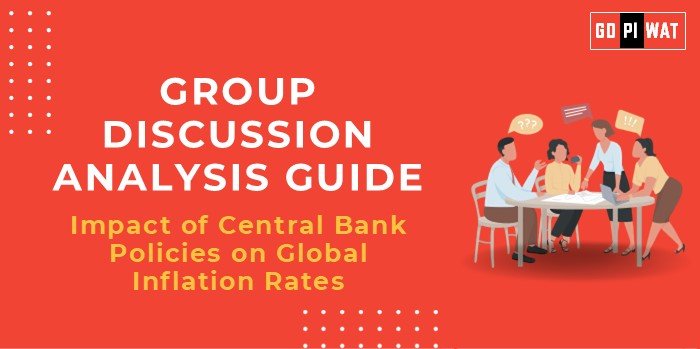📋 Group Discussion (GD) Analysis Guide: Impact of Central Bank Policies on Global Inflation Rates
🌐 Introduction to the Topic
Opening Context: Central bank policies are the backbone of modern economies, particularly in managing inflation. The global inflation peak in 2022 and the subsequent policy responses have highlighted the central role of monetary policies in stabilizing economies amidst global uncertainties.
Topic Background: Inflation rates soared to unprecedented levels in 2022, driven by supply chain disruptions and energy price surges. Central banks worldwide responded with aggressive interest rate hikes throughout 2023, shaping the economic landscape in both developed and emerging markets. These measures have led to mixed results, reflecting the complexity of monetary policy management in a globalized world.
📊 Quick Facts and Key Statistics
- 📈 Global Inflation Peak (2022): Reached 8.8%, driven by supply chain disruptions and rising energy prices.
- 💹 Rate Hikes (2023): Central banks globally raised interest rates, with the U.S. Federal Reserve reaching the highest levels in two decades.
- 🇪🇺 Eurozone Inflation (2024): Slowed to 2.3% in November 2024, down from a peak of 10.6% in late 2022.
- 🌍 Emerging Markets: Varied impacts, with some showing resilience while others face capital outflows and currency depreciation.
- 🌾 Global Food Prices: Hit an 18-month high in October 2024, complicating inflation management and growth efforts.
👥 Stakeholders and Their Roles
- Central Banks: Implement policies to curb inflation and stabilize economies.
- Governments: Support central bank efforts through complementary fiscal policies.
- Businesses: Adjust pricing and investment strategies to align with inflationary trends.
- Consumers: Face direct impacts, influencing spending and saving behaviors.
- International Bodies (IMF, World Bank): Assist vulnerable economies with policy advice and financial aid.
📈 Achievements and Challenges
- Achievements:
- ✔️ Inflation Reduction in Advanced Economies: Eurozone inflation dropped to 2.3% by November 2024, reflecting effective ECB policies.
- ✔️ Policy Resilience: Some emerging markets have shown the ability to withstand external shocks despite global tightening.
- ✔️ Innovative Monetary Tools: Expanded use of forward guidance and quantitative tightening strategies.
- Challenges:
- ⚠️ Global Food Price Surge: Rising food prices complicate inflation control efforts, particularly in vulnerable economies.
- ⚠️ Emerging Market Pressures: Capital outflows and currency depreciation threaten stability.
- ⚠️ Recession Risks: High-interest rates have slowed growth in several regions.
📊 Global Comparisons
- 🇺🇸 U.S.: Achieved inflation control but faces growth slowdown.
- 🇪🇺 Eurozone: Remarkable progress in reducing inflation to manageable levels.
- 🌍 Emerging Markets: Diverse outcomes, highlighting the global disparity in policy effects.
📝 Effective Discussion Approaches
- Opening Approaches:
- 📊 Statistical Impact: “Global inflation peaked at 8.8% in 2022, sparking aggressive rate hikes worldwide.”
- 📖 Case Study Highlight: “The Eurozone’s success in reducing inflation to 2.3% demonstrates effective monetary policy, but challenges remain for emerging markets.”
- Counter-Argument Handling:
- ⚖️ Recognize the complexity: “While rate hikes have moderated inflation in advanced economies, they risk triggering recessionary pressures in less resilient markets.”
- 💡 Suggest balanced approaches: “A mix of targeted fiscal and monetary measures is needed for sustainable growth.”
🔍 Strategic Analysis of Strengths and Weaknesses
- 🏆 Strengths: Central banks’ capability to stabilize prices; innovative tools like forward guidance.
- ⚠️ Weaknesses: Time lag in policy effects; uneven global outcomes.
- 🌍 Opportunities: Strengthening global financial frameworks; leveraging digital currencies.
- ⛔ Threats: Persistent high food prices; geopolitical risks.
📄 Structured Arguments for Discussion
- ✔️ Supporting Stance: “Monetary tightening has effectively reduced inflation in advanced economies, as seen in the Eurozone’s progress.”
- ⚠️ Opposing Stance: “Over-reliance on rate hikes risks economic slowdown and exacerbates inequalities between developed and emerging markets.”
- ⚖️ Balanced Perspective: “While monetary policies have curbed inflation, broader fiscal coordination and structural reforms are essential for long-term stability.”
📚 Connecting with B-School Applications
- Real-World Applications: Policy impact assessments in economics courses; internships focusing on central bank operations and global financial trends.
- Sample Interview Questions:
- 💬 “What lessons can emerging markets learn from the Eurozone’s inflation management?”
- 💬 “How can central banks balance inflation control with economic growth?”
- Insights for Students: Study cross-country policy impacts for a nuanced understanding of monetary systems; focus on integrating monetary and fiscal strategies in policy frameworks.


